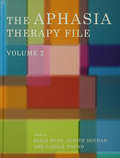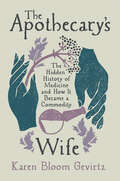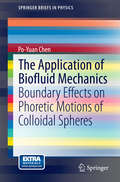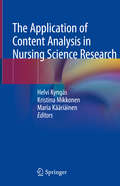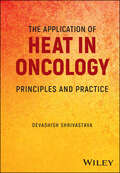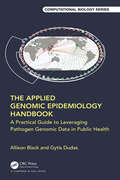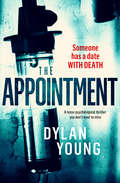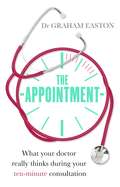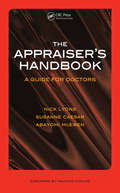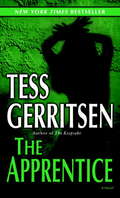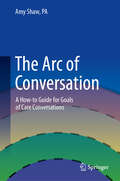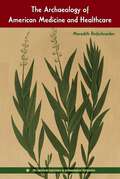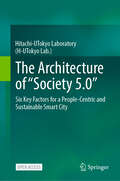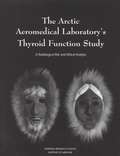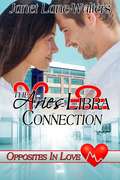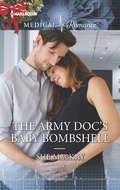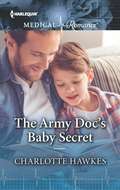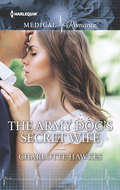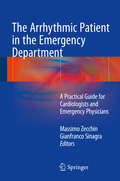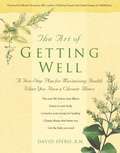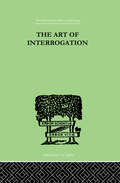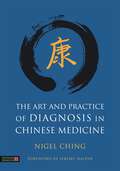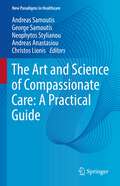- Table View
- List View
The Aphasia Therapy File: Volume 2
by Carole Pound Judith Duchan Sally ByngThe Aphasia Therapy Files represent a practical resource for people who work with individuals with aphasia, either as therapists or as researchers. An overview of issues associated with current practices is combined with a study of the practicalities of determining, designing and implementing therapies. This second volume continues to explore the possibility of bridging the gap between therapy in a clinical setting and the practical issues faced by the person living with aphasia. Each author presents one or more of their clinical practices in order to share their therapy experiences and reasoning with others. These contributions provide an insight into the complex issues that face both the practitioner and the person with aphasia, including discussion of subjects such as: Revealing competence and rethinking identity for people with severe aphasia using drawing and a communication book Respecting the rights of a person with aphasia to their own life choices: a longitudinal therapy study A group approach to the long-term rehabilitation of people with acquired head injury within the community Lexical and functionally based treatment: effects on word retrieval and conversation While each of the chapters is of considerable interest on its own, the final chapter offers readers a method of describing and capturing what happens in therapy and why, to enable comparisons between therapies and application by readers themselves. Written by speech and language therapists working in clinical practice, the studies included in this unique resource reflect the realities of everyday practice and will appeal to therapists, students and researchers in aphasia.
The Apothecary's Wife: The Hidden History of Medicine and How It Became a Commodity
by Karen Bloom GevirtzA groundbreaking genealogy of for-profit healthcare and an urgent reminder that centering women's history offers vital opportunities for shaping the future. The running joke in Europe for centuries was that anyone in a hurry to die should call the doctor. As far back as ancient Greece, physicians were notorious for administering painful and often fatal treatments—and charging for the privilege. For the most effective treatment, the ill and injured went to the women in their lives. This system lasted hundreds of years. It was gone in less than a century. Contrary to the familiar story, medication did not improve during the Scientific Revolution. Yet somehow, between 1650 and 1740, the domestic female and the physician switched places in the cultural consciousness: she became the ineffective, potentially dangerous quack, he the knowledgeable, trustworthy expert. The professionals normalized the idea of paying them for what people already got at home without charge, laying the foundation for Big Pharma and today’s global for-profit medication system. A revelatory history of medicine, The Apothecary’s Wife challenges the myths of the triumph of science and instead uncovers the fascinating truth. Drawing on a vast body of archival material, Karen Bloom Gevirtz depicts the extraordinary cast of characters who brought about this transformation. She also explores domestic medicine’s values in responses to modern health crises, such as the eradication of smallpox, and what benefits we can learn from these events.
The Application of Biofluid Mechanics
by Po-Yuan Chen"The Application of Biofluid Mechanics: Boundary Effects on Phoretic Motions of Colloidal Spheres" focuses on the phoretic motion behavior of various micron- to nanometer-size particles. The content of this book is divided into two parts: one on the concentration gradient-driven diffusiophoresis and osmophoresis, and one on thermocapillary motion and thermophoretic motion driven by temperature gradient. Diffusiophoresis and osmophoresis are mainly used in biomedical engineering applications, such as drug delivery, purification, and the description of the behavior of the immune system; thermocapillary motion and thermophoretic motion are applied in the field of semiconductors as well as in suspended impurities removal. The book also provides a variety of computer programming source codes compiled using Fortran for researchers' future applications. This book is intended for chemical engineers, biomedical engineers and scientists, biophysicists and fundamental chemotaxis researchers. Dr. Po-Yuan Chen is an Assistant Professor at the Department of Biological Science and Technology, China Medical University, Taichung, Taiwan.
The Application of Content Analysis in Nursing Science Research
by Helvi Kyngäs Kristina Mikkonen Maria KääriäinenThis book provides principles on content analysis and its application into development of nursing theory. It offers clear guidance to students, lecturers and researchers to gain a deeper understanding of the method of content analysis, its implementation into their own research and criteria of trustworthiness evaluation. The book is written in user-friendly language with provided research examples and cases, and the content is illustrated by figures and tables. The authors offer their expertise in providing a well thought through explanation of content analysis in didactical style, which will enhance university education. The book includes highly experienced researchers who have published articles on content analysis and the trustworthiness of the method with more than 10 000 citations. Divided into two parts, this book explores the application of content analysis into nursing science. The first part presents the philosophical position of content analysis, inductive and deductive methods of using content analysis, trustworthiness of the method, and ethical consideration of using content analysis. The second part informs on the theory development based on content analysis, conceptualization of the concepts of content analysis into generation of items and instrument development, and statistical testing of a hypothetical model. The last chapter shows a new approach to using content analysis in systematic reviews and quality evaluation of methodology within systematic review process. The book is an essential tool for nursing science, providing instruction on key methodological elements in order to provide rigorously conducted empirical research for clinical practice and nursing education.
The Application of Heat in Oncology: Principles and Practice
by Devashish ShrivastavaTHE APPLICATION OF HEAT IN ONCOLOGY Understand the use of heat to destroy tumors with this comprehensive guide Heat is an indispensable resource in the destruction of cancerous tumors to potentially treat cancers. There are also real challenges, however, involved in the total destruction of tumors without destroying healthy tissue surrounding the tumor in the process. A detailed understanding of the propagation of thermal energy, induced heating, and tissue responses to heat is required to safely and successfully apply heat-based technologies in clinical oncology. The Application of Heat in Oncology supplies this understanding, with a thorough, comprehensive overview of the principle and practice involved. Offering both a detailed introduction to the physics and thermodynamics of induced heat and an analysis of its clinical applications, this is an essential resource for clinicians, technicians, and others in oncological practice. The Application of Heat in Oncology readers will also find: Guidelines for applying heat both safely and effectively Detailed discussion of topics including energy delivery (e.g., via RF, MW, ultrasound, laser, cryoagents, hyperthermia, nanoparticles, etc.), temperature assessment, damage assessment, image guidance, and more Summary of current practice along with suggestions for future areas of technological improvement The Application of Heat in Oncology is ideal for all clinicians working in the field of cancer treatment, including medical students, residents, researchers, engineers, radiologists, surgeons, and more.
The Applied Genomic Epidemiology Handbook: A Practical Guide to Leveraging Pathogen Genomic Data in Public Health (Chapman & Hall/CRC Computational Biology Series)
by Allison Black Gytis DudasThe Applied Genomic Epidemiology Handbook: A Practical Guide to Leveraging Pathogen Genomic Data in Public Health provides rationale, theory, and implementation guidance to help public health practitioners incorporate pathogen genomic data analysis into their investigations. During the SARS-CoV-2 pandemic, viral whole genome sequences were generated, analyzed, and shared at an unprecedented scale. This wealth of data posed both tremendous opportunities and challenges; the data could be used to support varied parts of the public health response but could be hard for much of the public health workforce to analyze and interpret, given a historical lack of experience working with pathogen genomic data.This book addresses that gap. Structured into eight wide-ranging chapters, this book describes how the overlapping timescales of pathogen evolution and infection transmission enable exploration of epidemiologic dynamics from pathogen sequence data. Different approaches to sampling and genomic data inclusion are presented for different types of epidemiologic investigations. To support epidemiologists in diving into pathogen genomic data analysis, this book also introduces the analytic tools and approaches that are readily used in public health departments and presents case studies to show step-by-step how genomic data are used and evaluated in disease investigations.Despite the breadth of scientific literature that uses pathogen genomic data to investigate disease dynamics, there remains little practical guidance to help applied epidemiologists build their ability to explore epidemiologic questions with pathogen genomic data. This handbook was written to serve as that guide. Including case studies, common methods, and software tools, this book will be of great interest to public health microbiologists or lab directors, bioinformaticians, epidemiologists, health officers, academics, as well as students working in a public health context.
The Appointment: A Tense Psychological Thriller You Don't Want to Miss
by Dylan YoungA medical thriller “full of twists and secrets from the completely heartbreaking start to marvellously shocking yet satisfying ending . . . brilliant” (White Tulip Candles).He’s a doctor . . . but can you trust him?With his marriage collapsing and grief-stricken following the death of his baby son, surgeon Dan Lewis is struggling to make sense of it all.His work is his lifeline. But when he fixates on a child patient he thinks has a potentially lethal disease, no one believes the diagnosis. They all think he’s losing his mind.When one of Dan’s critics is senselessly murdered and the evidence points to the damaged doctor as the prime suspect, his bad situation becomes desperate.But there’s a dark secret linking the ill child and the murder victim. One that no one other than Dan can see.Can he overcome his paralyzing despair to reveal the truth and clear himself?And if he does, will he be in time to save an innocent child from a terrifying fate?
The Appointment: What Your Doctor Really Thinks During Your Ten-Minute Consultation
by Dr Graham EastonDespite the modern trend towards empowering patients and giving them more choice, the nuts and bolts of medical practice largely remain a mystery - a closed box. In fact, the more health information is available on the internet, the more patients can feel swamped and confused. The Appointment offers an intimate and honest account of how a typical GP tries to make sense of a patient's health problems and manage them within the constraints of their health system and the short ten minute appointment. We have always been fascinated by our own health but in recent years, especially for older people, seeing the GP has become a regular activity. In the past decade the average number of times a patient visits his or her GP has almost doubled. Despite this increasing demand, getting to see a GP is not always easy so those intimate ten minutes with the doctor are extremely precious, and there's more than ever to cram in. Taking the reader through a typical morning surgery, The Appointment shines a light onto what is really going on in those central ten minutes and lets the reader, for the first time, get inside the mind of the person sitting in front of them - the professional they rely on to look after their health. Experienced GP Dr Graham Easton shows how GPs really think, lays bare their professional strengths and weaknesses, and exposes what really influences their decisions about their patients' health.
The Appraiser's Handbook: v. 5, Substance Abuse, Palliative Care, Musculoskeletal Conditions, Prescribing Practice
by Nick Lyons Abayomi McEwen Susanne R CaesarThis book contains a foreword by Maurice Conlon, Associate Director, Appraisal and Revalidation Lead, NHS Clinical Governance Support Team. This is an invaluable, detailed guide offering practical resources for medical professionals in the challenging role of appraiser. It assists with confidence, professionalism and competency and contains a comprehensive, up-to-date summary of the 'state of play' for appraising doctors. It also includes sample forms, contracts for guidance and links to web resources. "The Appraiser's Handbook" provides vital information for all those involved in continuing professional development in primary and secondary care. Appraisal leads and managers in primary and secondary care trusts will find it of great interest, as will clinical tutors, GP tutors and deanery educational teams. "This book aims to support appraisers in developing their skills in order to ensure that the doctor whom they appraise, gains the maximum possible benefit from the time spent in, and preparing for, the appraisal. The appraiser will find appraisees who enthusiastically embrace appraisal and those who doubt its use and place in their professional development. Different approaches may be needed to support and understand different individuals." - Nick Lyons, Susanne Caesar and Abayomi McEwen. "This book, written by a trio steeped in appraisal, is a valuable resource for appraisers. It will help doctors learning to be appraisers, and experienced appraisers. It will also help those organising appraisal, to remind them of the aims of the process. Teachers of appraisal will be able to use it to supplement and support their curricula. I believe revalidation, when it arrives, will be the single biggest step towards improvement taken by the profession, since the introduction of the medical register. I also believe this depends upon the inclusion of appraisal within the revalidation package. Putting high-quality, developmental appraisal 'in the water' for the medical profession will bring about a whole-profession shift in terms of lifelong professional development. This book will support that aim." - Maurice Conlon, in the Foreword.
The Apprentice: A Rizzoli & Isles Novel (Rizzoli & Isles #2)
by Tess GerritsenBONUS: This edition contains an excerpt from Tess Gerritsen's Ice Cold. The bestselling author of The Surgeon returns--and so does that chilling novel's diabolical villain. Though held behind bars, Warren Hoyt still haunts a helpless city, seeming to bequeath his evil legacy to a student all-too-diligent . . . and all-too-deadly. THE APPRENTICE It is a boiling hot Boston summer. Adding to the city's woes is a series of shocking crimes, in which wealthy men are made to watch while their wives are brutalized. A sadistic demand that ends in abduction and death. The pattern suggests one man: serial killer Warren Hoyt, recently removed from the city's streets. Police can only assume an acolyte is at large, a maniac basing his attacks on the twisted medical techniques of the madman he so admires. At least that's what Detective Jane Rizzoli thinks. Forced again to confront the killer who scarred her--literally and figuratively--she is determined to finally end Hoyt's awful influence . . . even if it means receiving more resistance from her all-male homicide squad. But Rizzoli isn't counting on the U.S. government's sudden interest. Or on meeting Special Agent Gabriel Dean, who knows more than he will tell. Most of all, she isn't counting on becoming a target herself, once Hoyt is suddenly free, joining his mysterious blood brother in a vicious vendetta. . . . Filled with superbly created characters--and the medical and police procedural details that are her trademark--The Apprentice is Tess Gerritsen at her brilliant best. Set in a stunning world where evil is easy to learn and hard to end, this is a thriller by a master who could teach other authors a thing or two.
The Arc of Conversation: A How-to Guide for Goals of Care Conversations
by Amy Shaw, PAIntending to fill an important gap in medical training, this book presents an easy-to-learn, standardized approach to having compassionate and collaborative goals of care conversations with patients and families, a skill that can be difficult for clinicians to learn and that is not part of standard medical education curricula. Developed by a Palliative Care provider, this is the first book to teach everything clinicians need to know to gently guide patients and families through what can often be difficult discussions about illness, disease, end-of-life wishes, and hospice care. This technique can be used to discuss any medical diagnosis or treatment, be employed at any age or stage of an illness, and can be used by health care professionals at any level. Readers will be introduced to the patterns of decline patients follow toward the end of life, criteria for recognizing when a patient’s time is limited, hospice care, ground rules for compassionate communication, and a step-wise method of leading patients and families through difficult goals of care conversations in a collaborative way. The book includes specific questions to ask and starter language clinicians can use for developing their own patient-friendly talking points about disease progression, the end of life, concerns that a patient’s time is limited, advanced directives, code status, and hospice care. An Arc of Conversation Guide, for use when learning this technique, is also included. While modern medicine is terrific at acute stabilization of illness or injury, it often ignores the elephant in the room—disease progression and death. By doing so, the healthcare system frequently misses opportunities to align patient wishes with the care they receive. Furthermore, physicians often avoid difficult conversations with patients due to a lack of training or the assumption that hospice care represents medical or personal failure. Incorporating the material and technique taught in The Arc of Conversation into everyday practice will enable clinicians to acknowledge and discuss patient decline and to confidently include hospice care as a viable option for treatment that can support patient values, wishes, and priorities. Moving toward a continually collaborative approach with patients—a shift away from physician-directed care to patient-centered care—will enable clinicians to develop treatment plans that prioritize outcomes that matter most to patients and families, improving patient and family experience of health care across their lives and providing patients with the ‘soft landing’ they want at the end.
The Archaeology of American Medicine and Healthcare (The American Experience in Archaeological Perspective)
by Meredith ReifschneiderIn this book, Meredith Reifschneider synthesizes archaeological research on healthcare and medicine to show how practices in the United States have evolved since the nineteenth century, demonstrating that historical archaeology can provide important insights into healthcare and modes of self-care in the past.
The Archaeology of Medicine in the Greco-Roman World
by Patricia A. BakerThis book teaches students and scholars of Greco-Roman medical history how to use and critically assess archaeological materials. Ancient medicine is a subject dominated by textual sources, yet there is a wealth of archaeological remains that can be used to broaden our understanding of medicine in the past. In order to use the information properly, this book explains how to ask questions of an archaeological nature, how to access different types of archaeological materials, and how to overcome problems the researcher might face. It also acts as an introduction to the archaeology of medicine for archaeologists interested in this aspect of their subject. Although the focus is on the Greco-Roman period, the methods and theories explained within the text can be applied to other periods in history. The areas covered include text as material culture, images, artifacts, spaces of medicine, and science and archaeology.
The Architecture of “Society 5.0”: Six Key Factors for a People-Centric and Sustainable Smart City
by Hitachi-UTokyo LaboratoryThis open access book introduces H-UTokyo Lab’s ideas about the architecture for Society 5.0, including the process and organizational infrastructure for building smart cities that embody the Society 5.0 vision. It introduces six factors critical to the success of efforts to build people-centric sustainable smart cities. Each factor represents something needed to enable a local government to build a smart city, address the local issues, and ensure that these efforts contribute toward a people-centric sustainable society. The book is not only focused on initiatives that use digital innovation but extends beyond technological aspects, it also emphasizes the overall architecture—the general structures and organizational designs that encompass digital initiatives among other things. Through this book, readers get a better understanding of the current status of the smart-city agenda and its future path. The book is designed to serve as a handbook for public officials in national and local government, for businesspeople, for academics, for those in the third sector, and for any other actor involved in this undertaking.
The Arctic Aeromedical Laboratory's Thyroid Function Study: A Radiological Risk and Ethical Analysis
by Committee on Evaluation of 1950s Air Force Human Health Testing in Alaska Using Radioactive Iodine131During the 1950s, with the Cold War looming, military planners sought to know more about how to keep fighting forces fit and capable in the harsh Alaskan environment. In 1956 and 1957, the U.S. Air Force's former Arctic Aeromedical Laboratory conducted a study of the role of the thyroid in human acclimatization to cold. To measure thyroid function under various conditions, the researchers administered a radioactive medical trace, Iodine-131, to Alaska Natives and white military personnel; based on the study results, the researchers determined that the thyroid did not play a significant role in human acclimatization to cold.When this study of thyroid function was revisited at a 1993 conference on the Cold War legacy in the Arctic, serious questions were raised about the appropriateness of the activity--whether it posed risks to the people involved and whether the research had been conducted within the bounds of accepted guidelines for research using human participants. In particular, there was concern over the relatively large proportion of Alaska Natives used as subjects and whether they understood the nature of the study. This book evaluates the research in detail, looking at both the possible health effects of Iodine-131 administration in humans and the ethics of human subjects research. This book presents conclusions and recommendations and is a significant addition to the nation's current reevaluation of human radiation experiments conducted during the Cold War.
The Aries-Libra Connection (Opposites in Love, Medical Zodiac Romances #1)
by Janet Lane-Walters Canada Jude PittmanCan these two find a way to uncover the underhanded events at the hospital? They’re on opposite sides but the attraction between them is strong. She’s a widow who fought to save her husband’s life during a code. She feels guilty because the love she and her husband shared had died before his death. He assisted at the code but he feels guilty since he was the one who was responsible for the short staffing the night her husband died. Now they face falling in love and trying to solve the problems between the nurse’s union and the president of the hospital’s Board who wants a take over of the hospital by his hospital group. Is their connection strong enough to survive?
The Army Doc's Baby Bombshell: A Royal Baby For Christmas The Army Doc's Baby Bombshell Christmas With The Single Dad
by Sue MacKayFrom one night...to baby surprise! Surviving a bomb blast together led to an explosive night of passion between army docs Cooper Daniels and Sophie Ingram. But the next day Cooper shipped out, leaving Sophie with a lasting reminder of their desire! Cooper hasn't been able to forget Sophie, but commitment isn't an option for this lone wolf. So when the army throws them back together, her baby secret stuns him! The captain will give anything to protect his new family...but can he offer Sophie his heart?
The Army Doc's Baby Secret
by Charlotte HawkesHis wife is back……with his secret son!Since losing his leg on a mission, soldier Zeke Jackson has worked hard and come a long way; now a multi-millionaire he’s also committed to helping others. Yet nothing can prepare him for the moment his wife, army doctor Tia Farringdale, walks back into his life and reminds him just how powerful their connection still is… And Tia isn’t alone — she’s brought his son with her!“I love reading medical romances by Ms. Hawkes and this story was an absolute delight…Ms. Hawkes has delivered a very entertaining and wonderful read in this book….”— Harlequin Junkie on The Surgeon’s One-Night Baby“…this story is the best I’ve read by her yet due to the way it starts and just keeps getting better and better from the moment the hero and heroine meet. Really, there was so much to enjoy about this story including the powerful chemistry between the main characters; and the fast-paced plot had me hoping for the best for these two….”— Harlequin Junkie on A Bride to Redeem Him
The Army Doc's Secret Princess: The Army Doc's Secret Princess / Reunited With Her Hot-shot Surgeon (Mills And Boon Medical Ser.)
by Emily ForbesCould her royal fling……last a lifetime?Princess Viktoria made a promise: do her duty and marry a duke. But she wants one final adventure first! So she welcomes the freedom that working incognito at the Legion’s Games gives her. There’s only one tall, dark and brooding problem—surgeon and medical team leader Campbell Hamilton. Because the delicious-yet-damaged army doc leaves Viktoria wondering if the adventure she really wants is forever with the man she’s falling for…
The Army Doc's Secret Wife
by Charlotte HawkesFalling for her husband? Theirs was a marriage of convenience, born out of desperate circumstances, but Thea can't forget the wedding night she spent in Ben Abrams's arms! Only, by dawn it was all over and her army-doctor husband had shipped out-out of the country and her life! Now Ben is badly wounded, and Thea must nurse him back to health. Having lost her heart to her reluctant husband once, she fears getting close to him again. Dare she hope that this time Ben will choose his desire for her over duty?
The Arrhythmic Patient in the Emergency Department
by Gianfranco Sinagra Massimo ZecchinThis book is a practical guide to the differential diagnosis and treatment of patients presenting in the Emergency Department with syncope or arrhythmias, including bradyarrhythmias, atrial fibrillation, narrow and wide QRS tachycardias. In addition, clear advice is provided on the management of patients with cardiac devices and possible dysfunction, electrical storm, or a requirement for urgent surgery. For each topic, a literature review of epidemiology, physiopathology, differential diagnosis, and treatment is conducted. Furthermore, practical suggestions are offered for short-term management, e. g. , regarding the decision on when and where to hospitalize the patient; these proposals do not replace but rather summarize or integrate the current guidelines. The book is designed both for emergency physicians and cardiologists, who will be the first to evaluate and treat patients with arrhythmias or potentially arrhythmic problems in the emergency setting. It will also be a useful textbook for students and residents in Cardiology and Emergency Medicine.
The Art Of Getting Well: A Five-step Plan For Maximizing Health When You Have A Chronic Illness
by Martin L. Rossman David SperoA majority of chronic illnesses have no medical cure. The best therapy, asserts the author, is self-care. This comprehensive guide suggests healthy behaviors and holistic approaches while acknowledging the barriers people face in applying them.
The Art Of Interrogation: Studies in the Principles of Mental Tests and Examinations (International Library Of Psychology Ser.)
by Hamilton, E RFirst published in 1999. Routledge is an imprint of Taylor & Francis, an informa company.
The Art and Practice of Diagnosis in Chinese Medicine
by Nigel Ching Jeremy HalpinThis textbook on diagnosis in Chinese medicine is unique in its clarity and accessibility. Divided into two sections, it is a comprehensive diagnostic manual. The first section explains how to collect and collate the information required to formulate a diagnosis and is divided into four approaches: visual, palpation, interrogation and listening/smelling. The second section describes the various diagnostic models in Chinese medicine, including The Eight Principles; zangfu organ pattern; the Six stages, four levels and san jiao; the twelve regular channels and eight extraordinary vessels; and the Five Phases.
The Art and Science of Compassionate Care: A Practical Guide (New Paradigms in Healthcare)
by Christos Lionis Andreas Samoutis George Samoutis Neophytos Stylianou Andreas AnastasiouThis book provides a practical guide on the art and science of compassionate care in an era of healthcare crisis due to the COVID-19 pandemic that is inflicting long-lasting financial and psychosocial trauma on an unprecedented scale. A new approach to compassionate care is presented based on the overarching concepts of empathy, person and family centeredness, therapeutic relationship, kindness, gratitude, spirituality, communication skills, shared decision making, positive psychology, adversity-activated development, self-care, compassion fatigue, spirituality which are more than ever critical in successfully managing the pandemic adversity in front of us. This book draws on clinical experience, educational activities and evidence-based knowledge from academic physicians (primary, secondary and tertiary care), nurses, psychologists, health economists, healthcare managers, health policymakers, medical professionals students and patients. It provides skills and knowledge that can be implemented in daily clinical practice based on all levels of healthcare on a whole-person approach. An array of clinical cases, patient journeys, published evidence and practical experience is combined to deliver in a practical way unique guidance and advice. The target audience is all healthcare professionals, health policymakers, healthcare managers and patient associations. This approach of Compassionate Care is of great importance and can save lives and money in these unprecedented times of global healthcare care system challenges.
